
by Lorato | Jan 11, 2026 | Accolades and Achievements, All News, Alumni, SMU Media, Student Media
In a field where women remain underrepresented, Dr Dineo Tsabedze is charting her own course and building new pathways for others. Recently appointed as Academic and Clinical Head of the Department of Nuclear Medicine at Sefako Makgatho Health Sciences University (SMU) and Dr George Mukhari Academic Hospital (DGMAH), Tsabedze embodies a new era of leadership: one that merges cutting-edge science with inclusive, community-centred healthcare.
 A nuclear medicine specialist and accomplished academic, Tsabedze’s ascent reflects more than personal success. Her work signals a shift in South African healthcare leadership, where women are not just participating but defining the future of advanced medicine. From global collaborations to local outreach, she is expanding access to specialised diagnostics and championing a healthcare system where excellence and equity are not mutually exclusive.
A nuclear medicine specialist and accomplished academic, Tsabedze’s ascent reflects more than personal success. Her work signals a shift in South African healthcare leadership, where women are not just participating but defining the future of advanced medicine. From global collaborations to local outreach, she is expanding access to specialised diagnostics and championing a healthcare system where excellence and equity are not mutually exclusive.
Her journey is marked by a series of recent milestones that reinforce her growing influence in medicine. In 2024, she was admitted as a Fellow of the European Society of Cardiology (ESC), a prestigious international recognition that affirms her contributions to cardiovascular medicine. “It’s a humbling honour,” says Tsabedze. “It reflects years of dedication to cardiovascular research.”
She also serves as President of the Female Academic Leaders Fellowship Alumnae Association, an organisation committed to developing a strong pipeline of female academic leaders across South Africa. “Academic leadership must reflect the diversity of our society,” she says. “We need more women at the decision-making table in higher education.”
In addition to her leadership roles, Tsabedze was recently awarded a competitive fellowship to collaborate with the University of Oxford. This opportunity allows her to contribute to international research while also enhancing the profile of South African scholarship. “The Oxford collaboration is more than academic. It is about exchanging knowledge, building networks and raising the standard of care at home,” she notes.
Her academic record speaks volumes. With 29 peer-reviewed publications and 280 citations, Tsabedze has made notable contributions to nuclear medicine and cardiovascular research. Her work is frequently presented at international conferences, positioning her as a respected voice in global scientific circles.
Tsabedze’s impact extends well beyond academia. She is currently leading two community-based initiatives aimed at expanding access to nuclear medicine diagnostics and treatment in underserved areas. “Too often, advanced technologies are reserved for the privileged,” she remarks. “These projects aim to reverse that by bringing quality care to the marginalised.”
At SMU and DGMAH, where her leadership bridges academic excellence and clinical service, Tsabedze is positioning nuclear medicine as a driver of innovation and accessibility. Under her guidance, the department is embracing precision medicine and exploring the use of artificial intelligence in diagnostic imaging. “The future of nuclear medicine lies in personalisation and innovation,” she explains. Yet her vision extends beyond technology. Whether mentoring young women, leading international research, or transforming care models, her focus remains constant: opening doors for others. “I have mentors who opened doors for me. Now it’s my turn to do the same for others.”
For Tsabedze, leadership is not defined by position; it’s measured by impact, and in her leadership, both SMU and South African healthcare are finding new possibilities.
By Tumelo Moila

by Lorato | Nov 27, 2025 | Accolades and Achievements, All News, Alumni, SMU Media, Student Media
Sefako Makgatho Health Sciences University (SMU) proudly celebrates the recent recognition of its newly appointed Council member, Dr Nomonde Mabuya, who has been awarded the prestigious Ellen Kuzwayo Council Medal by the University of Johannesburg for her outstanding contribution to public health, occupational safety, and women’s empowerment.
 A medical doctor, occupational health specialist, academic, business leader, and social innovator, Mabuya has dedicated more than three decades to advancing the wellbeing of South Africans. Her distinguished career aligns strongly with SMU’s mission to cultivate leaders who drive transformation and improve the quality of life across the country.
A medical doctor, occupational health specialist, academic, business leader, and social innovator, Mabuya has dedicated more than three decades to advancing the wellbeing of South Africans. Her distinguished career aligns strongly with SMU’s mission to cultivate leaders who drive transformation and improve the quality of life across the country.
For over thirty years, Mabuya has been one of the country’s leading advocates for workplace health and safety. She has advised major institutions—including Vodacom, Deloitte, Standard Bank, Telkom, and the South African Reserve Bank—on employee wellness and occupational health programmes that have protected thousands of workers and significantly improved working conditions across sectors.
Her influence has been especially notable in the mining industry. Mabuya played a central role in developing South Africa’s fitness-for-work guidelines, adopted by the Department of Mineral Resources and Energy in 2014. These guidelines continue to serve as a national benchmark for fairness, accountability, and improved protection for vulnerable mineworkers.
 As CEO of Qalo DigiHealth, she is advancing healthcare accessibility through digital innovation, promoting the use of electronic health records, remote patient monitoring, and other technologies that make healthcare more effective, affordable, and responsive to patients’ needs.
As CEO of Qalo DigiHealth, she is advancing healthcare accessibility through digital innovation, promoting the use of electronic health records, remote patient monitoring, and other technologies that make healthcare more effective, affordable, and responsive to patients’ needs.
Mabuya’s contributions also extend to education and social development. Having lectured for 15 years at the University of Pretoria’s School of Public Health, she has shaped generations of health professionals. Her founding of the Women’s Sports Trust and Women Entrepreneurs Trust further demonstrates her commitment to empowerment, providing mentorship, scholarships, and funding opportunities for women and girls across the country.
Her medico-legal expertise has been equally influential through her work with the Road Accident Fund and her leadership as Chair of the HPCSA RAF Tribunal Committee, strengthening justice and fairness in medico-legal assessments.
The University of Johannesburg’s Ellen Kuzwayo Council Medal recognises leaders who advance social equity, transformation, and national development, qualities that Mabuya exemplifies. Her appointment to the SMU Council brings a powerful combination of strategic insight, public health expertise, and a deep commitment to societal impact.
Mabuya’s leadership continues to shape healthier, safer, and more equitable communities, an inspiring alignment with SMU’s vision of excellence and service to society.
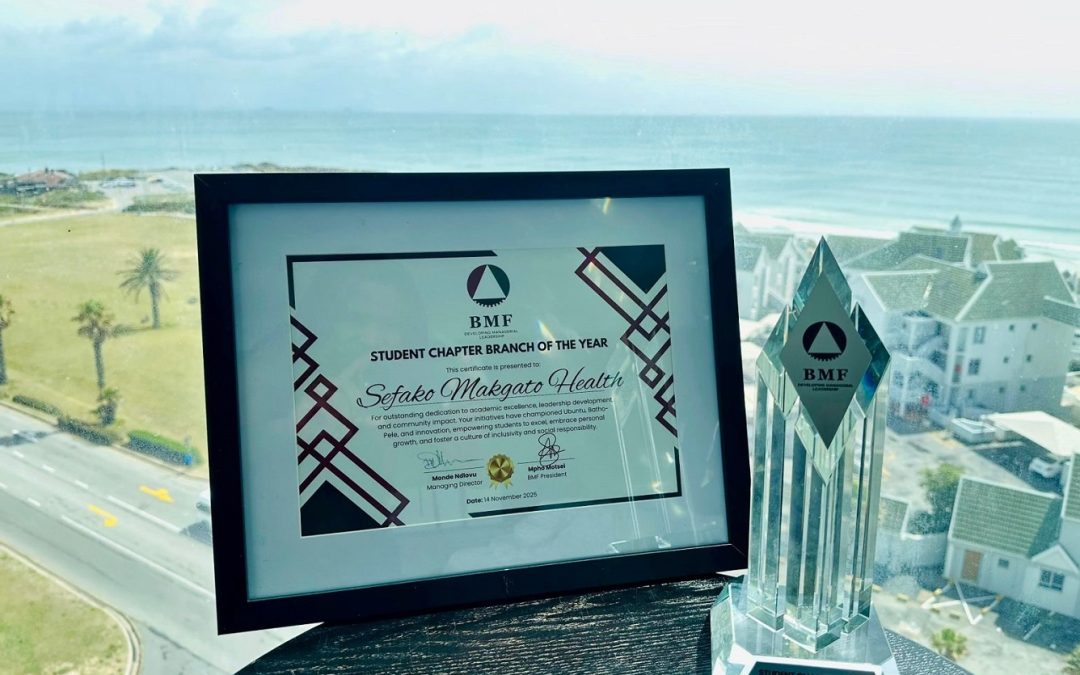
by Lorato | Nov 26, 2025 | Accolades and Achievements, All News, SMU Media, Student Media
The Black Management Forum Student Chapter at Sefako Makgatho Health Sciences University (BMF SC SMU) has been crowned BMF Student Chapter Branch of the Year, earning national recognition for exceptional leadership, bold innovation, and unwavering commitment to student development. The accolade, conferred during the 49th annual general meeting (AGM) held in Gqebherha, Eastern Cape, from 13–14 November 2025, marks a defining moment for the chapter after a year its executive describes as one driven by discipline, collaboration, and measurable impact.
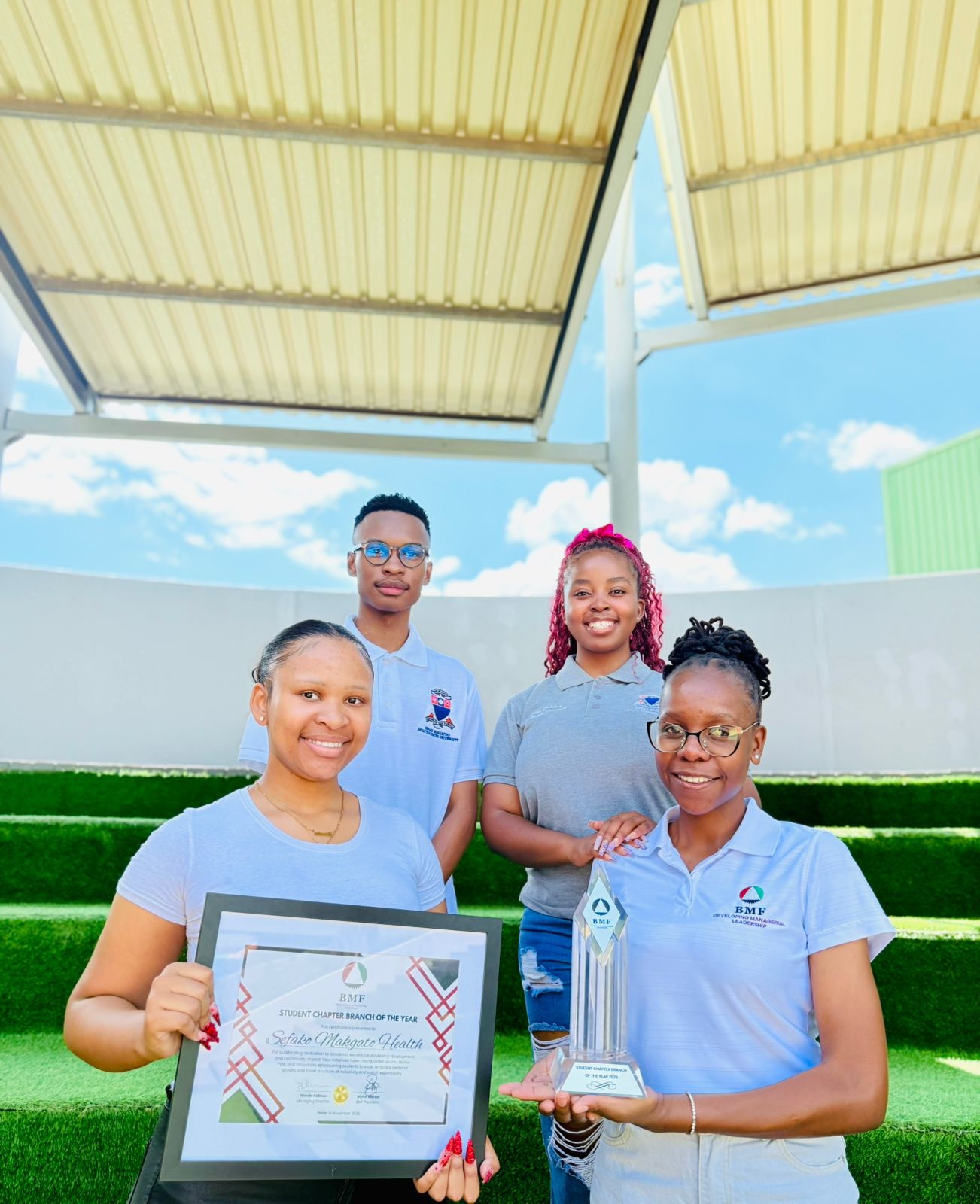 Chairperson Thato Phasha described the win as “a powerful affirmation of what focused, values-driven student leadership can achieve.” She added, “Our goal has always been to empower students with real opportunities for growth. This award proves that commitment pays off.”
Chairperson Thato Phasha described the win as “a powerful affirmation of what focused, values-driven student leadership can achieve.” She added, “Our goal has always been to empower students with real opportunities for growth. This award proves that commitment pays off.”
The accolade is presented to a student chapter that demonstrates exceptional performance across key areas, including academic excellence, youth development, and the promotion of values such as creativity, integrity, and accountability. According to the adjudicators, BMF SC SMU excelled by delivering evidence of meaningful programmes and sustained community engagement.
Secretary Thabiso Kekana highlighted the chapter’s strategic approach, saying: “We worked intentionally—every programme, every partnership, every event had to benefit students directly. Impact was our priority.”
At the core of the chapter’s work is the BMF mandate of “Developing Managerial Leadership,” which empowers young people preparing to enter the corporate and economic sectors. The Student Chapter aims to equip its members with managerial competence and an understanding of socio-economic transformation.
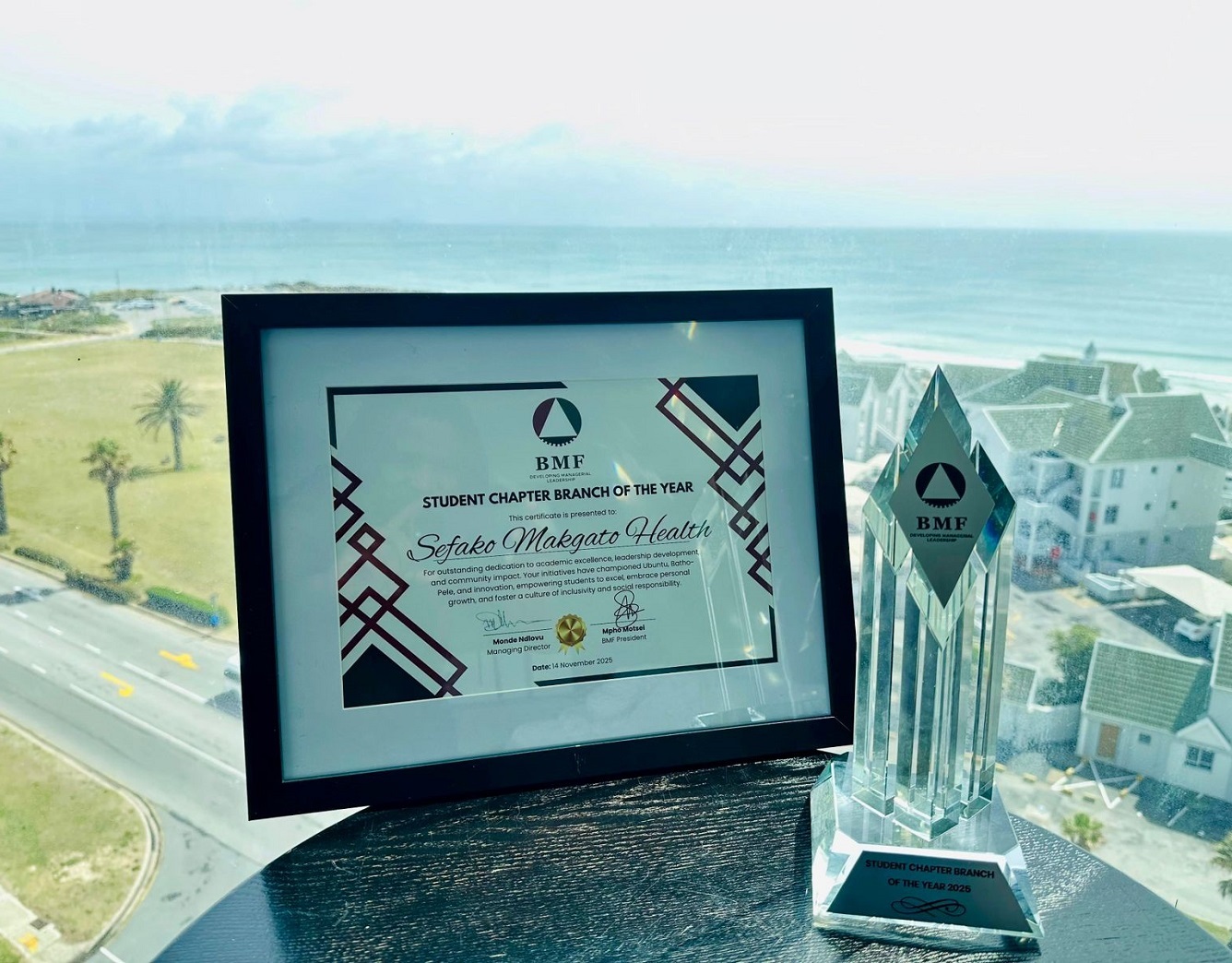 In 2024–2025, BMF SC SMU rolled out a series of high-impact initiatives. The Recruitment Drive strengthened member diversity, ensuring that more students gained access to leadership development platforms. The Mentorship and Tutorship Programme provided personalised academic support, contributing to improved performance and confidence among students.
In 2024–2025, BMF SC SMU rolled out a series of high-impact initiatives. The Recruitment Drive strengthened member diversity, ensuring that more students gained access to leadership development platforms. The Mentorship and Tutorship Programme provided personalised academic support, contributing to improved performance and confidence among students.
Economic empowerment remained a strong pillar of the chapter’s agenda. Entrepreneurship Day encouraged entrepreneurial thinking and innovation, while the Financial Literacy Programme equipped students with practical skills for budgeting, saving, and long-term financial planning. Women’s empowerment took centre stage through Empowered Women, Empowering Economies, an initiative that promoted financial independence and leadership among female students.
Reflecting on these initiatives, Gender and Transformation Officer Maobuseng Mafata noted: “Our programmes are designed to break barriers—academic, financial, and social. We are developing well-rounded leaders.”
Project Officer Confidence Chego added, “This year proved that collaboration is our strongest tool. When students feel supported, they excel.”
The chapter’s achievements were amplified through key partnerships with STANLIB and MoneyCare, which enhanced the professionalism and reach of its programmes. These collaborations, Phasha said, “allowed us to deliver initiatives at a national standard.”
Winning the national title has energised the chapter’s leadership. According to Kekana, the recognition serves as “a commitment to go even further, to create more opportunities, and to raise the bar for student leadership across the country.”
As BMF SC SMU looks ahead, its mission remains unchanged: to shape a generation of ethical, dynamic, and socially conscious leaders. With renewed national recognition and a proven track record, the chapter stands poised for an even more impactful future.
By Tumelo Moila
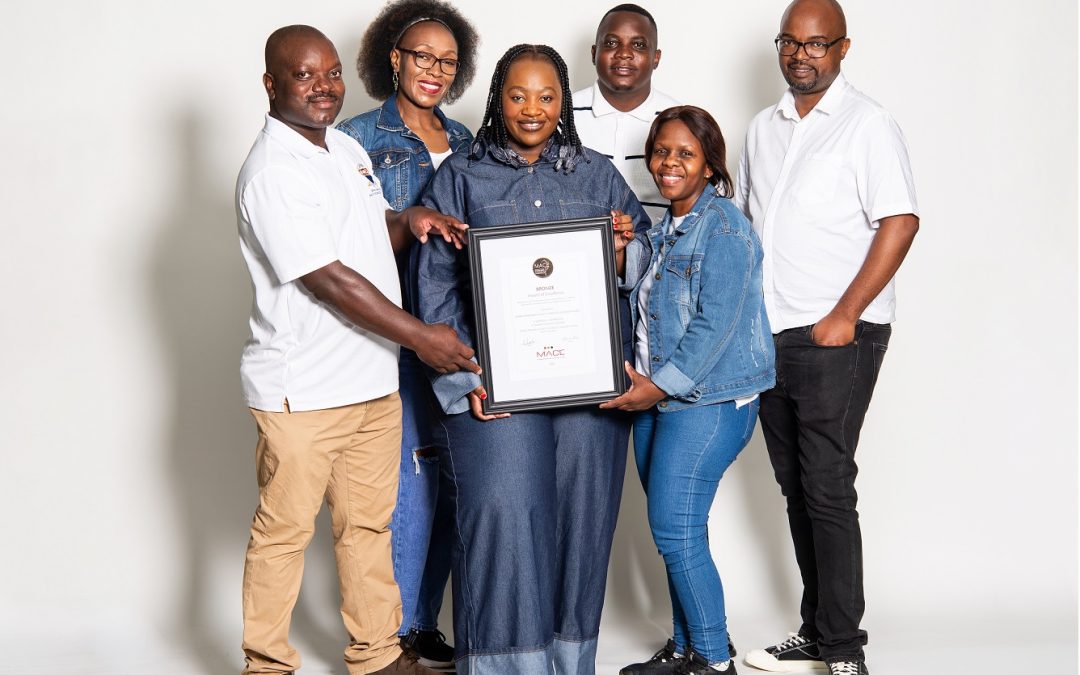
by Lorato | Nov 20, 2025 | Accolades and Achievements, All News, SMU Media, Student Media
In a year defined by strategic reinvention and unprecedented momentum, Sefako Makgatho Health Sciences University (SMU) has entered the national spotlight with its first-ever accolade from the prestigious Marketing, Advancement and Communication in Education (MACE) Excellence Awards. The recognition marks not only a milestone for the Communications and Public Relations Unit but also a defining moment in the university’s evolving institutional identity.
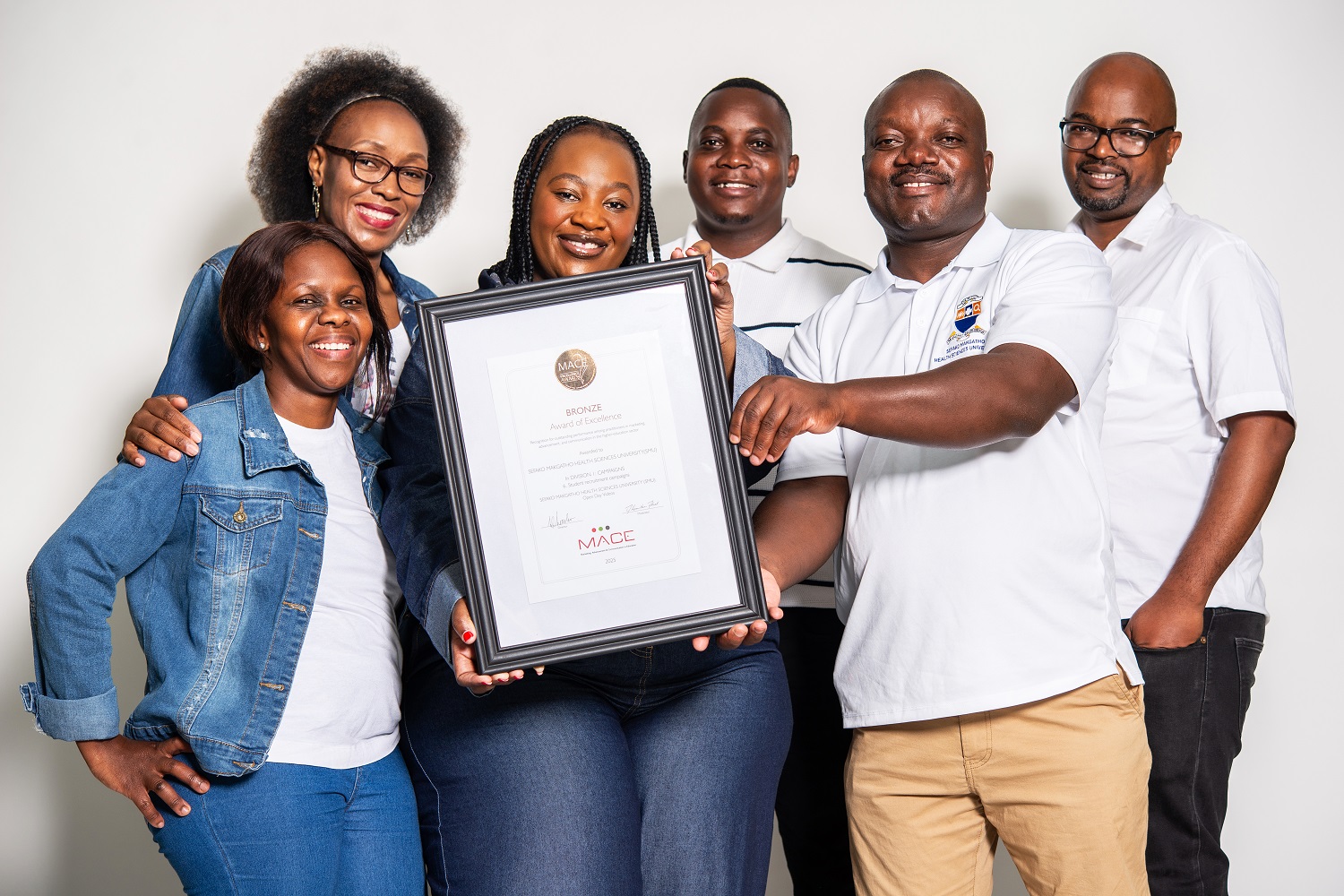 MACE, the sector’s leading professional body for higher-education communicators across Southern Africa, celebrates innovation, strategic excellence and impactful storytelling. Its awards are widely regarded as the sector’s highest honour, recognising institutions that demonstrate distinction in brand positioning, engagement and advancement. For SMU, competing among 26 universities, this achievement signals a shift in the university’s competitive posture and brand maturity.
MACE, the sector’s leading professional body for higher-education communicators across Southern Africa, celebrates innovation, strategic excellence and impactful storytelling. Its awards are widely regarded as the sector’s highest honour, recognising institutions that demonstrate distinction in brand positioning, engagement and advancement. For SMU, competing among 26 universities, this achievement signals a shift in the university’s competitive posture and brand maturity.
This recognition emerges from a year in which the Communications and Public Relations Unit underwent a remarkable transformation, reshaped through refined processes, elevated outputs and a clarified strategic purpose. Since assuming leadership in October 2024, Tshimangadzo Mphaphuli, Manager: Communications and Public Relations, has guided a deliberate repositioning of the unit anchored in rigorous storytelling, institutional clarity and competitive brand visibility. It has been, in many ways, a re-awakening of SMU’s voice.
Reflecting on the achievement, Mphaphuli says: “When I assumed duty, I knew that SMU possessed an extraordinary story—rich, rigorous and rooted in purpose. My vision has always been to craft a brand presence that mirrors the calibre of our academic excellence, our people and our impact. This award signals that our voice is now resonating beyond our borders, and we are only getting started.”
Under her leadership, the unit delivered some of the institution’s most sophisticated communication outputs to date. Institutional publications were revitalised into rich, editorially strong, visually compelling assets that reflected SMU’s academic prestige and social impact. Digital communication experienced its strongest year yet, with engagement rising by nearly 50%, follower growth accelerating significantly, and search engine optimisation positioning SMU among South Africa’s most visible health-sciences brands. These gains, achieved through disciplined strategy and a commitment to excellence, created the foundation for the national recognition the university celebrates today.
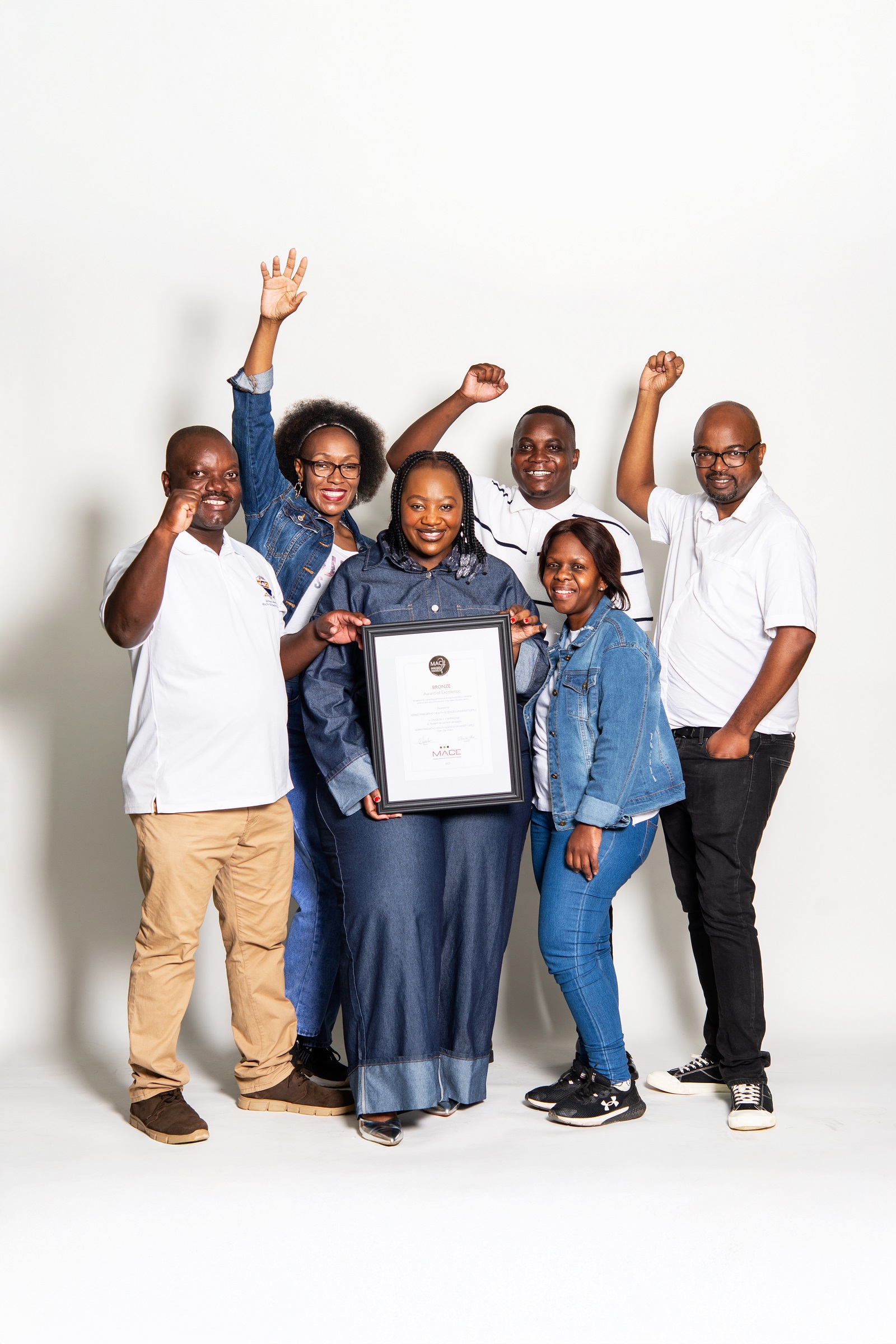 But the triumph belongs equally to the team whose collective dedication sharpened SMU’s communications edge. Public Relations Officer Tumelo Moila notes that the award reflects a relentless pursuit of agility. “We had to operate at the speed of the sector,” he explains. “Our work demanded creativity, instinct and a willingness to constantly stretch ourselves. This isn’t just a win, it’s a reflection of our readiness to compete nationally.”
But the triumph belongs equally to the team whose collective dedication sharpened SMU’s communications edge. Public Relations Officer Tumelo Moila notes that the award reflects a relentless pursuit of agility. “We had to operate at the speed of the sector,” he explains. “Our work demanded creativity, instinct and a willingness to constantly stretch ourselves. This isn’t just a win, it’s a reflection of our readiness to compete nationally.”
Team member, Public Relations Officer, Dimakatso Modise, echoes this sentiment, emphasising the team’s evolution. “We became a unit that embraces complexity,” he says. “Our landscape shifts daily, and we’ve learned to shift with it—always with excellence at the centre of everything we produce.”
The excellence was not confined to written communication alone. The university’s visual language underwent a noticeable elevation under the creative direction of Graphic Designer Dineo Motshegare, whose artistry strengthened brand identity, event branding, and publication design throughout 2025. “Our role is to reflect SMU’s essence visually, emotionally and with precision,” she shares. “Design became a strategic enabler, not an accessory. This recognition validates that approach,” adds Motshegare.
The surge in online visibility was also powered by meticulous web optimisation and digital stewardship led by Web Editor Lorato Molubi, who ensured that SMU’s online platforms aligned with global accessibility, SEO, and content consistency standards. “We focused on making SMU discoverable, authoritative and trustworthy in the digital space,” she explains. “Seeing our SEO rankings climb was proof that our digital storytelling is resonating.”
Within the communications ecosystem, SMU FM’s contributions played a central role in strengthening internal communication and real-time storytelling on campus. “Radio became a conduit for immediacy and authenticity,” says Mpho Legodi.
Collaboration extended beyond the unit itself. In 2025, the Communications and Public Relations Unit worked closely with Student Recruitment Officer, Ntsheu Collins Mangena, to align recruitment messaging with the university’s broader brand narrative. “Strategic recruitment relies on strategic communication,” Mangena reflects. “By working hand-in-hand with the Communications & Public Relations Unit, we were able to position SMU in a way that spoke powerfully to prospective students and their parents. This award confirms the strength of that alignment.”
The achievement has been warmly welcomed by university leadership. Acting DVC: Operations, Odette Ramsingh, who oversees the unit’s strategic direction, praised the milestone as a significant accomplishment for SMU. “This award reflects the team’s collective effort in positioning the university’s reputation on a national scale, especially as the recognition comes against the backdrop of competing with 26 other universities. It is also a powerful affirmation of the excellence, creativity and dedication of our Communications and Public Relations team, whose strategic work continues to elevate SMU’s voice and presence. Their commitment to position SMU is central to achievements such as these.”
As SMU steps into 2026, the MACE recognition serves not merely as an award but as a marker of strategic excellence, in which the institution’s voice is sharper, its story more confidently told, and its reputation increasingly aligned with national and continental expectations for a modern health sciences university.
What began as an internal transformation has now entered the national stage. And with a unified team carrying forward a shared vision, SMU’s voice—once quiet—has become unmistakably resonant.

by Lorato | Oct 30, 2025 | Accolades and Achievements, All News, Alumni, SMU Media, Student Adverts
A brilliant young scholar from Sefako Makgatho Health Sciences University (SMU), Tumiso Matsobane Kekana, is redefining the intersection of Mathematics and Material Science through his pioneering research in Chemical Graph Theory (CGT). His work, which investigates the structural and mechanical properties of complex molecular compounds such as dendrimers and graphene, has attracted both national and international recognition for its scientific precision and potential applications in nanotechnology and materials engineering.
 Born on 22 July 1997, Kekana recently graduated cum laude with a Master of Science in Mathematics from SMU. His dissertation, “Computational Analysis of Complex Dendrimer and Graphene Structures via Neighbourhood Multiple Degree-based Topological Indices and M-Polynomials,” advances the mathematical modelling of molecular structures and their behaviours under various conditions.
Born on 22 July 1997, Kekana recently graduated cum laude with a Master of Science in Mathematics from SMU. His dissertation, “Computational Analysis of Complex Dendrimer and Graphene Structures via Neighbourhood Multiple Degree-based Topological Indices and M-Polynomials,” advances the mathematical modelling of molecular structures and their behaviours under various conditions.
“Mathematics is not just about numbers—it’s about revealing the patterns that govern our universe,” he explains. “Through Chemical Graph Theory, we can predict the properties of materials before they even exist in a lab. That’s the power of mathematical innovation.”
At the core of Kekana’s study lies the use of Topological Indices (TIs)—numerical descriptors that model molecular structures as graphs. His research introduces neighbourhood multiple degree-based TIs, offering more accurate predictions of graphene’s mechanical properties, such as Young’s Modulus, Poisson’s Ratio, and Shear Modulus. His results confirm the predictive strength of these mathematical tools, marking a step forward in computational chemistry.
Beyond research, Kekana is a full-time lecturer in SMU’s Department of Mathematics and Applied Mathematics, where he teaches Advanced Calculus and Linear Algebra and mentors young mathematicians. Through his involvement in the department’s Community Engagement Committee, he helps organise mathematics competitions and outreach programmes for high school learners, nurturing future problem-solvers.
“Relevance beats cleverness every time,” he reflects. “If our teaching and research don’t connect to real-world challenges, then we’ve missed the purpose of science.”
 Kekana’s contributions have been recognised through peer-reviewed publications in international journals such as Frontiers in Applied Mathematics and Statistics and Discrete Mathematics, Algorithms and Applications. His recent paper, co-authored with Dr Kazeem Aremu and Professor Maggie Aphane, presents a new method for computing topological descriptors of graphene using Neighbourhood Multiple M-Polynomials—a breakthrough simplifying complex molecular analysis.
Kekana’s contributions have been recognised through peer-reviewed publications in international journals such as Frontiers in Applied Mathematics and Statistics and Discrete Mathematics, Algorithms and Applications. His recent paper, co-authored with Dr Kazeem Aremu and Professor Maggie Aphane, presents a new method for computing topological descriptors of graphene using Neighbourhood Multiple M-Polynomials—a breakthrough simplifying complex molecular analysis.
Kekana’s success story began on the dusty streets of Ivory Park. After matriculating from Thuto Ke Maatla Comprehensive School in 2015 with results that initially barred university admission, he spent two years upgrading his marks at Tembisa High ABET School. In 2018, he was finally accepted to study Mathematics at SMU—a dream fuelled by his mentor, Godfrey Tshehla (PhD candidate in Financial Mathematics at Wits), whose passion for mathematics inspired him deeply.
Although he failed his Honours year in 2021, his supervisor, Dr Aremu, refused to let him quit. “He reminded me of my ‘why’,” Kekana recalls. Repeating the programme in 2022, he graduated with distinction.
Yet another obstacle emerged after his Honours degree: university debt barred him from accommodation and registration. Forced back to his two-room shack in Ivory Park, he began his Master’s degree under severe hardship—no electricity, no proper study space, and constant financial strain. To survive, he sold achaar and relied on Hands of Compassion, the SMU feeding scheme. Drawn by the difficult environment, he briefly turned to gambling (dice), even becoming a “knox man” as a means of survival. Despite these challenges, he completed his MSc degree cum laude in record time and published two Q2-ranked journal papers.
Now a PhD student, full-time researcher, and lecturer, Kekana’s journey embodies resilience, passion, and purpose. “Where you start doesn’t define where you can go,” he says. “With perseverance, even dust can give birth to diamonds.”
By Tumelo Moila
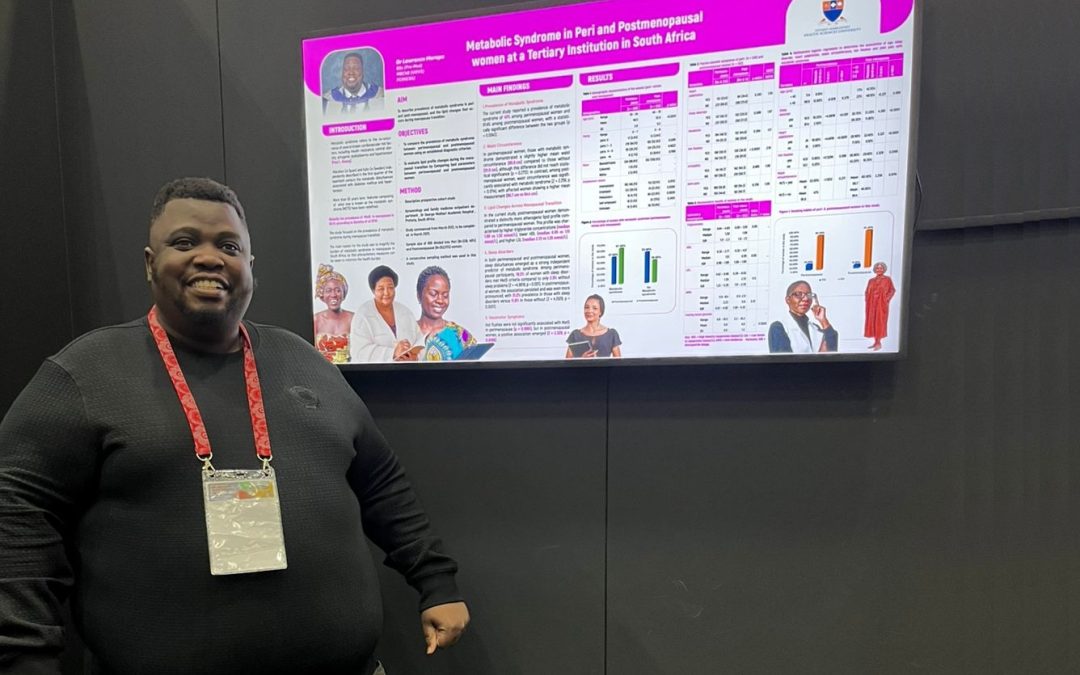
by Lorato | Oct 16, 2025 | Accolades and Achievements, All News, SMU Media, Student Media
A South African researcher has made academic history after his pioneering study on metabolic syndrome in menopausal women was published by the American Journal of Obstetrics and Gynaecology Global Reports (AJOG Global Reports) — the first from Sefako Makgatho Health Sciences University (SMU) to achieve this distinction.
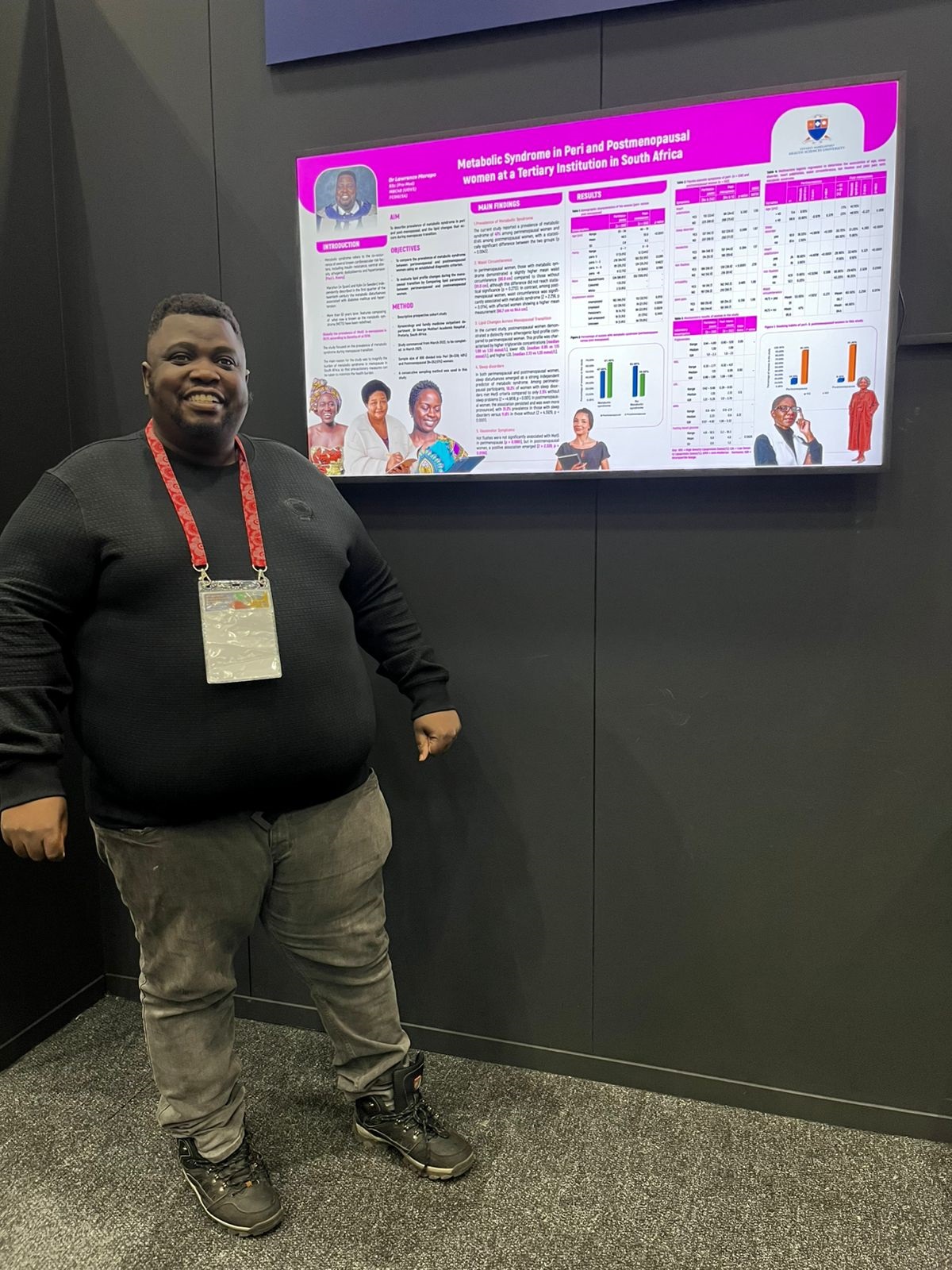 Lecturer and postgraduate student, Dr Lawrence Marapo, from SMU’s Department of Obstetrics and Gynaecology, led a large-scale investigation examining how menopause influences metabolic syndrome — a cluster of risk factors including obesity, hypertension, and abnormal lipid levels that increase the likelihood of heart disease and diabetes. Conducted at Dr George Mukhari Academic Hospital (DGMAH) between March 2022 and March 2025, the study assessed 690 South African women, making it one of the most extensive of its kind on the continent.
Lecturer and postgraduate student, Dr Lawrence Marapo, from SMU’s Department of Obstetrics and Gynaecology, led a large-scale investigation examining how menopause influences metabolic syndrome — a cluster of risk factors including obesity, hypertension, and abnormal lipid levels that increase the likelihood of heart disease and diabetes. Conducted at Dr George Mukhari Academic Hospital (DGMAH) between March 2022 and March 2025, the study assessed 690 South African women, making it one of the most extensive of its kind on the continent.
The research revealed a stark difference between perimenopausal and postmenopausal women. Nearly half (47%) of perimenopausal women and over 60% (61.4%) of postmenopausal women were found to have metabolic syndrome — a statistically significant result highlighting menopause as a major turning point for women’s health. “The findings confirm that menopause itself is a moderate-to-high risk factor for metabolic syndrome,” Dr Marapo explained. “Postmenopausal women carry a heavier metabolic burden, underscoring the urgent need for targeted healthcare strategies.”
The study also linked sleep disorders, vasomotor symptoms, and dyslipidaemia to higher metabolic risk, with waist circumference and body mass index (BMI) exceeding global risk thresholds in both groups. These findings mirror global data but offer rare insight into the African population, where research on menopausal metabolic health remains limited.
Dr Marapo’s research has attracted significant international recognition. He recently presented the findings at the FIGO 2025 World Congress and has been invited to present in Rome, Italy, at the International Endocrinology and Metabolic Syndrome Congress in December 2025. His growing reputation has also earned him an invitation to serve as a committee member and presenter at the International Conference on Geriatrics and Gerontology in Kuala Lumpur, Malaysia, scheduled for May 2026.
While awaiting the formal marking of his research, Marapo has already completed a PhD research protocol in the same field, signalling his ongoing commitment to improving the understanding and management of menopause-related conditions among African women.
“This milestone not only represents a personal achievement but also a victory for SMU and South African science,” said Marapo. “It shows that locally generated research can shape global conversations on women’s health.”
The study was supervised by Prof Lineo Matsela, with contributions from Prof Olakunle Adewunmi Towobola, Dr Muponisi Ezekiel Chabalala, and other SMU academics. It has been praised for its robust methodology, ethical rigour, and its potential to inform clinical interventions that could reduce cardiovascular and metabolic complications in midlife women.
As menopause becomes an increasingly important focus in public health, Marapo’s work sets a new benchmark for African research excellence — confident, data-driven, and globally relevant.
By Tumelo Moila

 A nuclear medicine specialist and accomplished academic, Tsabedze’s ascent reflects more than personal success. Her work signals a shift in South African healthcare leadership, where women are not just participating but defining the future of advanced medicine. From global collaborations to local outreach, she is expanding access to specialised diagnostics and championing a healthcare system where excellence and equity are not mutually exclusive.
A nuclear medicine specialist and accomplished academic, Tsabedze’s ascent reflects more than personal success. Her work signals a shift in South African healthcare leadership, where women are not just participating but defining the future of advanced medicine. From global collaborations to local outreach, she is expanding access to specialised diagnostics and championing a healthcare system where excellence and equity are not mutually exclusive.

 A medical doctor, occupational health specialist, academic, business leader, and social innovator, Mabuya has dedicated more than three decades to advancing the wellbeing of South Africans. Her distinguished career aligns strongly with SMU’s mission to cultivate leaders who drive transformation and improve the quality of life across the country.
A medical doctor, occupational health specialist, academic, business leader, and social innovator, Mabuya has dedicated more than three decades to advancing the wellbeing of South Africans. Her distinguished career aligns strongly with SMU’s mission to cultivate leaders who drive transformation and improve the quality of life across the country. As CEO of Qalo DigiHealth, she is advancing healthcare accessibility through digital innovation, promoting the use of electronic health records, remote patient monitoring, and other technologies that make healthcare more effective, affordable, and responsive to patients’ needs.
As CEO of Qalo DigiHealth, she is advancing healthcare accessibility through digital innovation, promoting the use of electronic health records, remote patient monitoring, and other technologies that make healthcare more effective, affordable, and responsive to patients’ needs.
 Chairperson Thato Phasha described the win as “a powerful affirmation of what focused, values-driven student leadership can achieve.” She added, “Our goal has always been to empower students with real opportunities for growth. This award proves that commitment pays off.”
Chairperson Thato Phasha described the win as “a powerful affirmation of what focused, values-driven student leadership can achieve.” She added, “Our goal has always been to empower students with real opportunities for growth. This award proves that commitment pays off.” In 2024–2025, BMF SC SMU rolled out a series of high-impact initiatives. The Recruitment Drive strengthened member diversity, ensuring that more students gained access to leadership development platforms. The Mentorship and Tutorship Programme provided personalised academic support, contributing to improved performance and confidence among students.
In 2024–2025, BMF SC SMU rolled out a series of high-impact initiatives. The Recruitment Drive strengthened member diversity, ensuring that more students gained access to leadership development platforms. The Mentorship and Tutorship Programme provided personalised academic support, contributing to improved performance and confidence among students.
 MACE, the sector’s leading professional body for higher-education communicators across Southern Africa, celebrates innovation, strategic excellence and impactful storytelling. Its awards are widely regarded as the sector’s highest honour, recognising institutions that demonstrate distinction in brand positioning, engagement and advancement. For SMU, competing among 26 universities, this achievement signals a shift in the university’s competitive posture and brand maturity.
MACE, the sector’s leading professional body for higher-education communicators across Southern Africa, celebrates innovation, strategic excellence and impactful storytelling. Its awards are widely regarded as the sector’s highest honour, recognising institutions that demonstrate distinction in brand positioning, engagement and advancement. For SMU, competing among 26 universities, this achievement signals a shift in the university’s competitive posture and brand maturity. But the triumph belongs equally to the team whose collective dedication sharpened SMU’s communications edge. Public Relations Officer Tumelo Moila notes that the award reflects a relentless pursuit of agility. “We had to operate at the speed of the sector,” he explains. “Our work demanded creativity, instinct and a willingness to constantly stretch ourselves. This isn’t just a win, it’s a reflection of our readiness to compete nationally.”
But the triumph belongs equally to the team whose collective dedication sharpened SMU’s communications edge. Public Relations Officer Tumelo Moila notes that the award reflects a relentless pursuit of agility. “We had to operate at the speed of the sector,” he explains. “Our work demanded creativity, instinct and a willingness to constantly stretch ourselves. This isn’t just a win, it’s a reflection of our readiness to compete nationally.”
 Born on 22 July 1997, Kekana recently graduated cum laude with a Master of Science in Mathematics from SMU. His dissertation, “Computational Analysis of Complex Dendrimer and Graphene Structures via Neighbourhood Multiple Degree-based Topological Indices and M-Polynomials,” advances the mathematical modelling of molecular structures and their behaviours under various conditions.
Born on 22 July 1997, Kekana recently graduated cum laude with a Master of Science in Mathematics from SMU. His dissertation, “Computational Analysis of Complex Dendrimer and Graphene Structures via Neighbourhood Multiple Degree-based Topological Indices and M-Polynomials,” advances the mathematical modelling of molecular structures and their behaviours under various conditions. Kekana’s contributions have been recognised through peer-reviewed publications in international journals such as Frontiers in Applied Mathematics and Statistics and Discrete Mathematics, Algorithms and Applications. His recent paper, co-authored with Dr Kazeem Aremu and Professor Maggie Aphane, presents a new method for computing topological descriptors of graphene using Neighbourhood Multiple M-Polynomials—a breakthrough simplifying complex molecular analysis.
Kekana’s contributions have been recognised through peer-reviewed publications in international journals such as Frontiers in Applied Mathematics and Statistics and Discrete Mathematics, Algorithms and Applications. His recent paper, co-authored with Dr Kazeem Aremu and Professor Maggie Aphane, presents a new method for computing topological descriptors of graphene using Neighbourhood Multiple M-Polynomials—a breakthrough simplifying complex molecular analysis.
 Lecturer and postgraduate student, Dr Lawrence Marapo, from SMU’s Department of Obstetrics and Gynaecology, led a large-scale investigation examining how menopause influences metabolic syndrome — a cluster of risk factors including obesity, hypertension, and abnormal lipid levels that increase the likelihood of heart disease and diabetes. Conducted at Dr George Mukhari Academic Hospital (DGMAH) between March 2022 and March 2025, the study assessed 690 South African women, making it one of the most extensive of its kind on the continent.
Lecturer and postgraduate student, Dr Lawrence Marapo, from SMU’s Department of Obstetrics and Gynaecology, led a large-scale investigation examining how menopause influences metabolic syndrome — a cluster of risk factors including obesity, hypertension, and abnormal lipid levels that increase the likelihood of heart disease and diabetes. Conducted at Dr George Mukhari Academic Hospital (DGMAH) between March 2022 and March 2025, the study assessed 690 South African women, making it one of the most extensive of its kind on the continent.